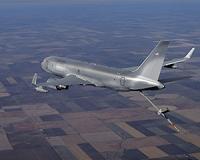| . |  |
. |
Abu Dhabi, United Arab Emirates (UPI) Feb 25, 2011 Despite unprecedented political upheaval across the Middle East and North Africa, the United Arab Emirates has announced defense contracts worth $3.8 billion at the close of the region's biggest arms exhibition. There was little indication that the unrest that has driven the president of Egypt and Tunis from office, after 32 years and 23 years respectively, and threatens to topple the entire regime of Libyan leader Moammar Gadhafi has stifled the arms business in the region. More than 1,000 defense and aerospace companies showcased their wares at IDEX, 30 percent more than the last expo in 2009, underlining the big bucks to be made in the Middle East and the Arab states of the Persian Gulf in particular. However, as the political unrest intensified, several Arab governments announced large food and subsidy programs aimed at heading off trouble from their people, particularly the young and unemployed. The only government to publicly divert funds from defense to food is Baghdad. It declared Feb. 16 it would spend $900 million, allocated as a down payment for the purchase of 18 Lockheed Martin F-16 jets, on providing food for an estimated 5 million poor. On Wednesday, King Abdallah of Saudi Arabia announced a $36 billion package of housing, social welfare and employment programs. The Saudis are grappling with a looming leadership succession and power transfer of their own. The global security consultancy Stratfor observed that Abdallah's actions "send a clear signal that Riyadh takes the political risks of social unrest seriously." The decisions by Britain and German to suspend weapons sales to Libya, an oil power that until a few weeks ago they were falling over themselves to arm, has done little to dampen the region's enthusiasm for new weapons, or the eagerness of U.S. and European governments to make huge profits selling them. Saudi Arabia and the United Arab Emirates, the main military powers on the western shore of the gulf, spend the most on weapons procurement than in the developing world. The Saudi defense budget swelled from $24.9 billion in 2001 to $41.2 billion in 2009, a 65 percent increase. The Emirates' defense budget mushroomed 700 percent from $1.9 billion to $15.4 billion. The defense budgets of tiny Kuwait, a vital U.S. logistics base, and even tinier Bahrain, headquarters of the U.S. 5th Fleet, also soared by 35 percent and 80 percent respectively. The Saudis are on the receiving end of a U.S. arms package worth in excess of $60 billion over the next few years. All told, Middle Eastern states are expected to spend $123 billion on arms in that period. U.S. arms sales will account for most of all this. The Emirates, meaning largely the oil-rich emirate of Abu Dhabi, is planning to spend $6 billion on defense over the next eight years. "It's difficult to judge the impact of the latest events, and those probably to come, on the outlook for the promising defense market," observed Nicolas von Kospoth, managing editor of the Defense Professionals Web site. "The wildfire of uprisings and protests spreading throughout the region and their present unexpected results, has shown how unpredictable the political and strategic development has become within a matter of a few weeks." Western governments and defense contractors, he said, "may have to deal with an entirely new environment for their traditional and choreographed leverages. "In particular, the United States might have to significantly rearrange its picture of the region "Still relatively unaffected by the wave of uprisings in the region, Saudi Arabia and the United Arab Emirates, at present, appear to be the last considerable strongholds of U.S. influence in the Arab world," von Kospoth concluded. Western defense executives at IDEX remained optimistic. Greg Churchill, executive vice president of Rockwell Collins, which is expected to pick up $60 million-$70 million of the U.S. package to Saudi Arabia, said he expects the contracts to be finalized within six months. Eric Trappier, international executive VP of France's Dassault Aviation, said he was confident his firm would win a $10 billion deal to sell 60 Rafale multi-role fighters to the Emirates despite stiff U.S. competition. Lockheed Martin's Dennis Cavin said the Emirates will finalize a $7 billion deal for the Terminal High Altitude Area Defense missile system, the firm's first foreign sale, by the spring.
Share This Article With Planet Earth
Related Links The Military Industrial Complex at SpaceWar.com Learn about the Superpowers of the 21st Century at SpaceWar.com
 Boeing wins massive US air tanker contract
Boeing wins massive US air tanker contractWashington (AFP) Feb 24, 2011 US aerospace giant Boeing on Thursday won a massive contract to supply aerial refueling tankers to the Air Force, defeating European rival EADS in a long and tortuous contest. Announcing the first part of a contract worth more than $30 billion, the Pentagon said: "Boeing was a clear winner." The US firm is now tasked with delivering 18 aircraft by 2017, but the contract is expected to gr ... read more |
|
| The content herein, unless otherwise known to be public domain, are Copyright 1995-2010 - SpaceDaily. AFP and UPI Wire Stories are copyright Agence France-Presse and United Press International. ESA Portal Reports are copyright European Space Agency. All NASA sourced material is public domain. Additional copyrights may apply in whole or part to other bona fide parties. Advertising does not imply endorsement,agreement or approval of any opinions, statements or information provided by SpaceDaily on any Web page published or hosted by SpaceDaily. Privacy Statement |